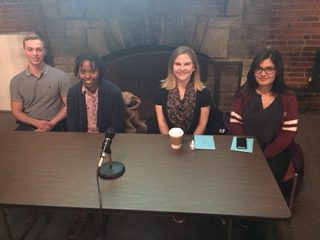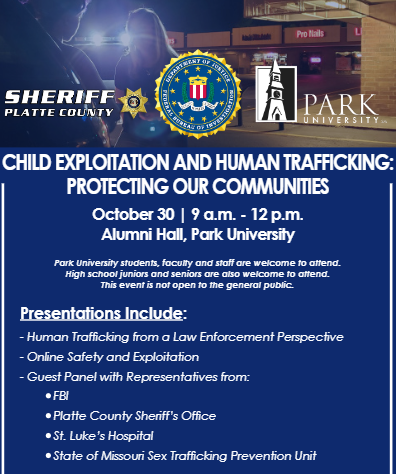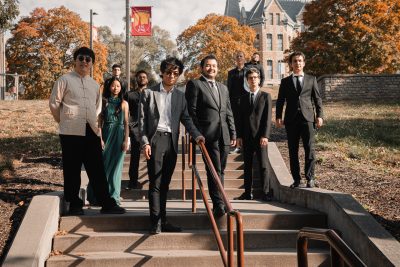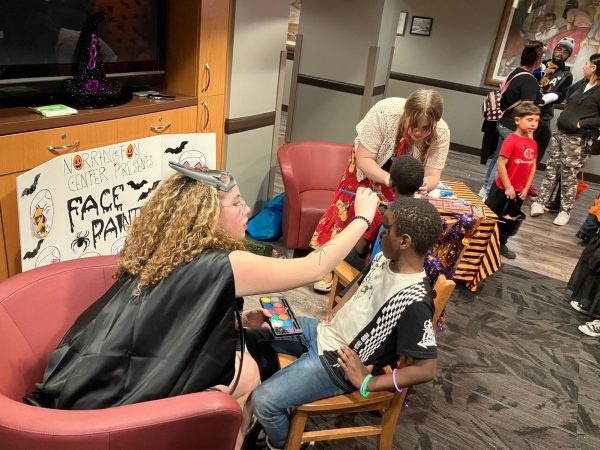Intersectionality panel discussion with Spectrum

Left to right: Nic Halsey, Aaricka Haggins, Emma Givens, Iroda Narzullaeva
Spectrum, the LGBTQIA+ advocacy and support club on campus, recently hosted a panel discussion called “Intersectionality in the Modern Era,” in keeping with the Year of Diversity theme. Spectrum brought four panelists to the Nov. 21 meeting to answer questions and offer insights and perspectives from various walks of life.
The panelists were Iroda Narzullaeva, a computer science major at Park who is from Uzbekistan; Emma Givens, a marketing and international business major at Park from Kansas City; Nic Halsey, an economics major at Park from Iowa; and Aaricka Haggins, who is not a student at Park but is a local comedian and minister.
Gunner Backues-Eberspacher, president of Spectrum, started the meeting with a video that defined intersectionality. To summarize, intersectionality involves the interconnected nature of categorizations used in society, such as race, gender, ability, class and sexuality. When the label of “intersectional” is applied it’s generally to bring attention to the fact that a person is being discriminated against for more than one aspect of their identity.
The first question asked panelists to describe assumptions they think others have about them, and whether or not there’s truth or advantage to those assumptions.
“Most people just see a white woman,” Givens said. “[There are] assumptions that come with that, including [the assumption that I live] a life of inherent privilege, which I agree with. I think people assume I come from a life that doesn’t face adversary, and that’s correct.”
On assumptions people make about her, Haggins said, “I think people think being gay was a choice [for me], but I believe I was born this way.”
Haggins also mentioned that cleaning restrooms at work sometimes presents moments of aversion or assumption.
“Sometimes,” she said, “when I clean the women’s restroom people think I’m a man. I dress like this to deter the attractions of men, and I think a lot of women don’t understand that.”
Haggins also mentioned her race. “I think being black, I’m often perceived as less intelligent or having less mental strength,” she said, “but in my role, I make enough money and get compensated for my work. I put myself out there as a comedian to be the center of attention. I like to make people laugh and make them happy. I know how to make friends in any situation I’m in and I’m learning how to overcome disadvantages of being black. We still face discrimination but I guess I’m getting used to it.”
The second question asked panelists to consider whether or not they fall into a traditional or “normal” romantic sequence of dating leading to marriage leading to children, often in a heterosexual relationship. Did the panelists fit this? If not, how is society treating them?
“Coming from a different country,” Narzullaeva responded, “it’s different for us. It’s expected that by 25 you’re married with a child and don’t have much need for education. For me, leaving my parents’ house was a big step because in my culture you’re not supposed to leave your parents’ house until you get married.”
Givens said, “I grew up Catholic and went to church every Sunday. My household wasn’t strict, but my mom would say things like, ‘It’s fine if you’re gay but wait until your grandparents are dead.’” Givens identifies as bisexual heteroromantic, which means she is sexually attracted to men and women but doesn’t see herself forming romantic relationships with women – just men.
“The whole ‘date, get serious, have kids’ has always been on my mind. But being a small part of [LGBTQIA+] spectrum and culture has changed the way I think about that. I think the traditional familial structure is a big part of my life, but I think it’s more internal. And the life I’m creating outside of home is far from that. I worry about what will happen when they intersect.”
Haggins identifies as a lesbian, though she was sexually and emotionally involved with men before coming out. “But I have a hard time connecting emotionally with men. I have a hard time trying to satisfy society and the norms that come with it. I didn’t come out until I was an adult, and I’ve always wanted to adopt a child. I’m constantly getting God’s assurance that I’m on the right path.”
“As long as you’re loving someone,” Haggins said, “I think that’s all that matters. I don’t think we have to follow the rules that society has paved out for us. Just follow what makes you happy. I’m content being a lesbian in this lifetime, and God’s cool with it, so I’m ecstatic. … God is love, so if you’re injecting love into the world, I think you’re doing a fine job.”
Halsey expressed that he did date women until his twenties, and then deviated from the norm by preferring male partners.
“I never paid attention to the norm of this step, then this, then this,” Halsey said. “But my boyfriend and I have been together for two and a half years, and I guess you could say it’s serious, and we want to get married. We plan on adopting eventually. So I guess the only deviation is that my partner is a man.”
There were questions which were intended to be more personal, as well. Halsey discussed the challenge of being gay in the military.
“I wasn’t out in the armed forces,” he said, “because I thought it would affect my advancement or my cohesiveness with my team. It was hard to keep it secret, it was added pressure, because my buddies would joke around and I had to be part of it so it was sometimes a little self-deprecating. So it didn’t affect my ability to do my job, but it was hard.”
Narzullaeva discussed how deviating from her culture and being a woman in a male-dominated field – computer science – has affected her and that after high school, she wanted to pursue an associate’s degree in her home country. On the first day of class, she found that she was one of four women in a class of 28 men.
“In my culture,” she said, “when you finished high school you’re expected to start a family, higher education isn’t really part of it. But when I came here I saw different people. The culture here is different because back home people are not open minded. So, I knew I’d be discriminated against,” Narzullaeva said, “with people thinking I should be at home or having kids. And here it’s been better.”
“I know if I want to get an education I’ll have to stay and fight through it,” she said. “I gave up on trying to prove someone something. I come to class to learn something new, to have new knowledge in my brain. That’s the goal I have every day. It’s not that I need to show off; it’s not a point for me to prove a man wrong about me. It’s more about being open minded and accepting. I’m not here to prove anyone anything.”
Your donation will support the student journalists of Park University. Your contribution will allow us to cover our annual website hosting costs, freeing up other funds for equipment, printing and training.





